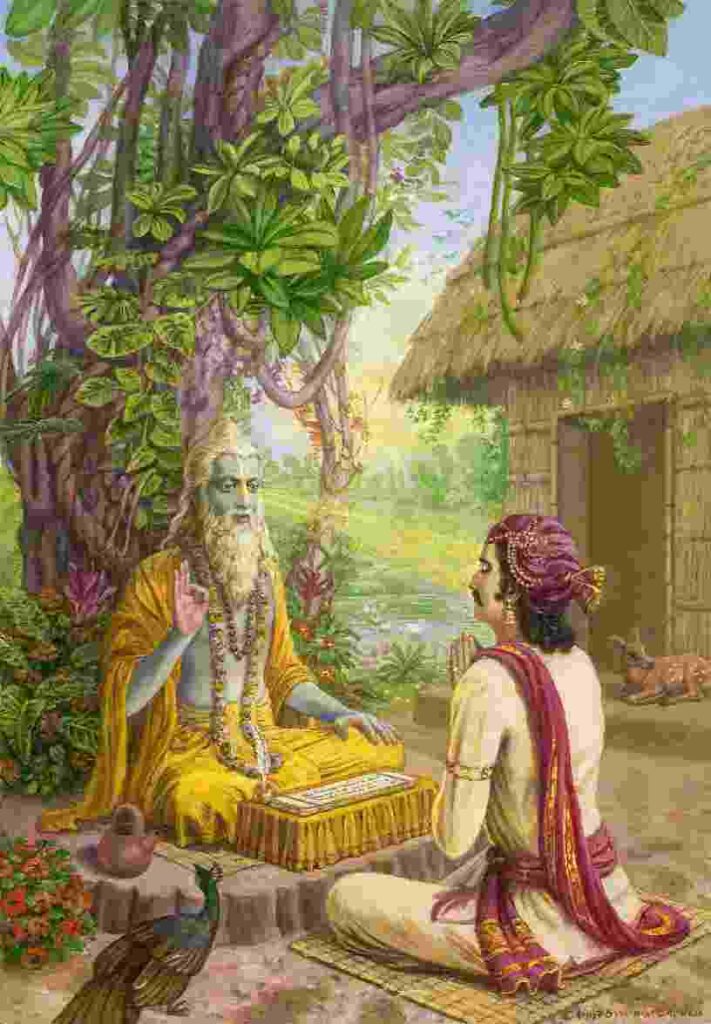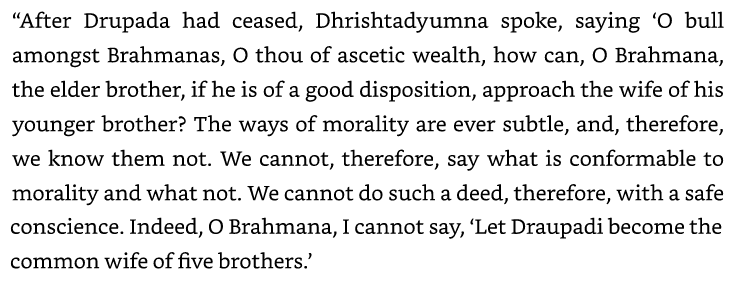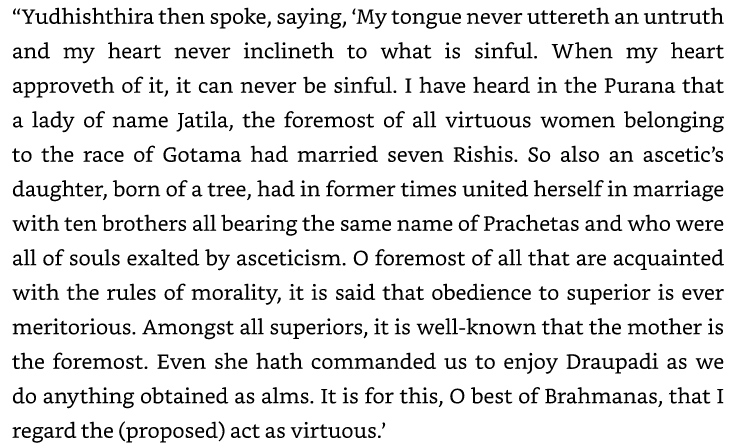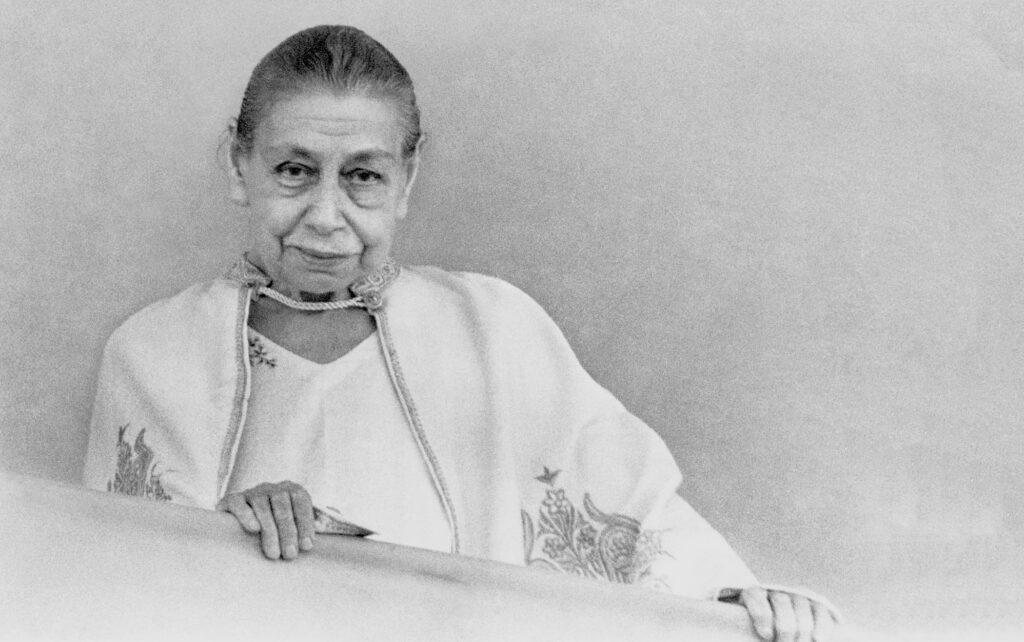A Discussion on Morality: Ved Vyasa Addresses Kunti, Drupada, Yudhishthira, and Drishtadyumna

After Draupadi’s swayamvar, she (cheerfully) went with Arjuna and Bhima to the potter’s house where the Pandavas were staying in disguise.
The next day, King Drupada (Draupadi’s father), sent his priest to the potter’s house to invite them for a feast at his palace.
Till this point, the king did not know their identity. He had a strong feeling, based on his son, Dhrishtadyumna’s, secret observations, that the youth who had fulfilled the difficult challenge, was none other than Arjuna, but he still wasn’t certain. After Kunti, Draupadi, and the Pandavas arrived at his palace, Drupada asked Yudhishthira about their identity. Yudhishthira, knew that King Drupada cherished the desire to marry his daughter Draupadi to Arjuna. He finally revealed their true identity to King Drupada in his palace.
King Drupada was not only relieved that his daughter was about to be married into a noble and virtuous family, but he was also overjoyed and exuberant that his desire for obtaining Arjuna as his son-in-law was fulfilled. He suggested that Arjuna and Draupadi perform the marriage rites immediately since it was an auspicious day. Till this point, King Drupada was unaware of what had transpired at the potter’s house between Kunti, Draupadi, and the five Pandavas, and about the proposal that she marry all five brothers.
It was only when he suggested the marriage rites, that Yudhishthira said, he too would have to marry Draupadi. This took the king by surprise. He (possibly) did not register the implication of what Yudhishthira had just said, so he suggested that instead of Arjuna marrying Draupadi, Yudhishthira, being the eldest brother, may marry her. However, Yudhishthira clarified that all five brothers would have to marry Draupadi.
This proposal made King Drupada very uneasy. He was put into a dilemma, because he was unsure of the morality of one woman marrying five men and, he did not want his daughter to enter into a morally questionable alliance.
It was during this critical and delicate situation that Ved Vyasa came to the palace. Everyone immediately stopped the discussion to welcome and worship the great rishi. After honouring the sage, the king approached him with his doubts regarding the proposed marriage.
Quoting from the unabridged Mahabaharata, below.

Ved Vyasa replied that the practice of one woman having many husbands had become obsolete because it was opposed to the Vedas and present-day customs, but, that didn’t mean it was sinful. However, before giving further explanations, he asked everyone assembled there to share their opinion.
What follows are the opinions of King Drupada, his son, Drishtadyumna, Yudhishthira, and Kunti. Finally, after hearing them, Ved Vyasa presents his own views about the marriage.
King Drupada’s Opinion
Drupada went by social precedence as well as the Vedas. He wasn’t aware of any precedence where one woman had taken many husbands, and because this practice was opposed to the Vedas, he was not in favour of the proposal. Quoting the exact passage below.

Drishtadyumna’s Opinion
Drishtadyumna believed that an elder brother of good conscience would never approach his younger brother’s wife. He agreed that the ways of morality were subtle and he also confessed that the subtlety was beyond his understanding, and therefore, he could not agree to this proposal with a clear conscience. Quoting the exact passage below.

Yudhishthira’s Opinion
Yudhishthira took a different approach to the dilemma. He was aware of two precedences where a (virtuous) woman had many husbands. But along with precedence, he also gave importance to his inner feeling. He believed that his purity and truthfulness made his disposition such that he would not incline toward a sinful act. If an act was sinful, his heart would instinctively reject it, and because his heart approved of this marriage, it was not immoral.
He went on to cite the two precedences. The first example was from the Puranas, where a virtuous maiden called Jatila (of the Gotama race) had married seven rishis. In the second example, he cited the case of an ascetic’s daughter who had married ten brothers who were also exalted ascetics themselves.
Finally, he went on to say that because his mother (whom he considered the foremost among superiors) had said so, the marriage couldn’t be immoral.
Quoting the exact passage below.

Kunti’s Opinion
Kunti regarded her eldest son Yudhishthira (who was born of her union with Dharmaraja himself) as an authority on dharma. Therefore, since he approved of the marriage, she did not believe it to be incorrect. However, she did put forth her concern about her speech becoming untrue and having to face the consequences of that.

Ved Vyasa’s Answer to Everyone
Ved Vyasa first addressed Kunti to ease her conscience. He remarked that even the (genuine) concern she had of saving herself from the consequences of untruth showed how pure she was, and this itself was eternal virtue.
He went on to agree with Yudhishthira’s reasoning, however, he did not want King Drupada to simply take his word on the matter and agree to the marriage. He wanted to reveal to King Drupada, the subtle and celestial forces that acted behind the material world. Therefore, he took King Drupada to a room, where they would be alone, and revealed the celestial form of Draupadi and the Pandavas. Click here to read the story that describes how Drupadi was the Goddess Adi Para Shakti herself and the five Pandavas were five Indras.
I am quoting Ved Vyasa’s words below.

After saying this, Ved Vyasa took the King to a separate room and explained to him that Draupadi was actually the Goddess Adi Para Shakti herself, and the five Pandavas were five Indra. He went on to describe how their marriage was ordained by Lord Shiva himself. Not only did Ved Vyasa explain all this, but he also granted the king, divine sight, through which he could see his daughter and the five Pandavas in their celestial form.
King Drupada’s dilemma was resolved after seeing Drupadi and the five Pandavas in their celestial form and understanding that Lord Shiva himself had ordained this marriage. If Lord Shiva had ordained it then it was beyond simple moral law and he had no objection.
Some Additional Thoughts
I like this particular interaction between Ved Vyasa and the others because in dealing with the issue of Draupadi’s marriage, it also points to the larger issue of social norms, the Vedas, and morality. Vyasa muni shows us how Divine forces act behind the scenes to influence human life, and because we are not aware of these forces, we cannot judge morality based solely on logic, precedence, and even the Vedas. However, that doesn’t mean we can totally disregard morality. I’ll leave you with three quotes by the Auroville Mother (Sri Aurobindo’s spiritual partner) on this topic.

You can break the moral rules only when you observe the Divine Law.
The Mother, May 1966
You have no right to dispense with morality unless you submit yourself to a law that is higher and much more rigorous than any moral law.
The Mother, 28th May 1947
Moral laws have only a very relative value from the point of view of Truth. Besides, they vary considerably according to country, climate and period. Discussions are generally sterile and without productive value. If each one makes a personal effort of perfect sincerity, uprightness and good-will, the best conditions for the work will be realised.
The Mother, August 1966
